The 9 best AI writing tools in 2025: A practical guide

Stevia Putri
Last edited August 25, 2025

Let's be real: trying to create great content all the time is tough. It can feel like a content treadmill you can't get off. AI writing tools have popped up to help take some of that weight off your shoulders. This guide will walk you through the top tools for different jobs, whether you're in marketing, SEO, or handling business communications, so you can find the one that actually fits your workflow.
What is an AI tool in writing?
At its heart, an AI tool in writing is a specialized app that uses a Large Language Model (LLM) the same tech behind chatbots like ChatGPT and Claude. But here’s the important difference: unlike those do-it-all bots, these tools are fine-tuned for specific writing jobs.
Think of it this way: ChatGPT is like a giant library with every book imaginable, while a dedicated AI writing tool is the librarian who knows exactly which book (or template) you need. Whether you're trying to draft a blog post, come up with some catchy ad copy, or write customer support replies, these tools are built to help you get it done faster and with less hassle. They're not meant to replace human creativity, but to work alongside it.
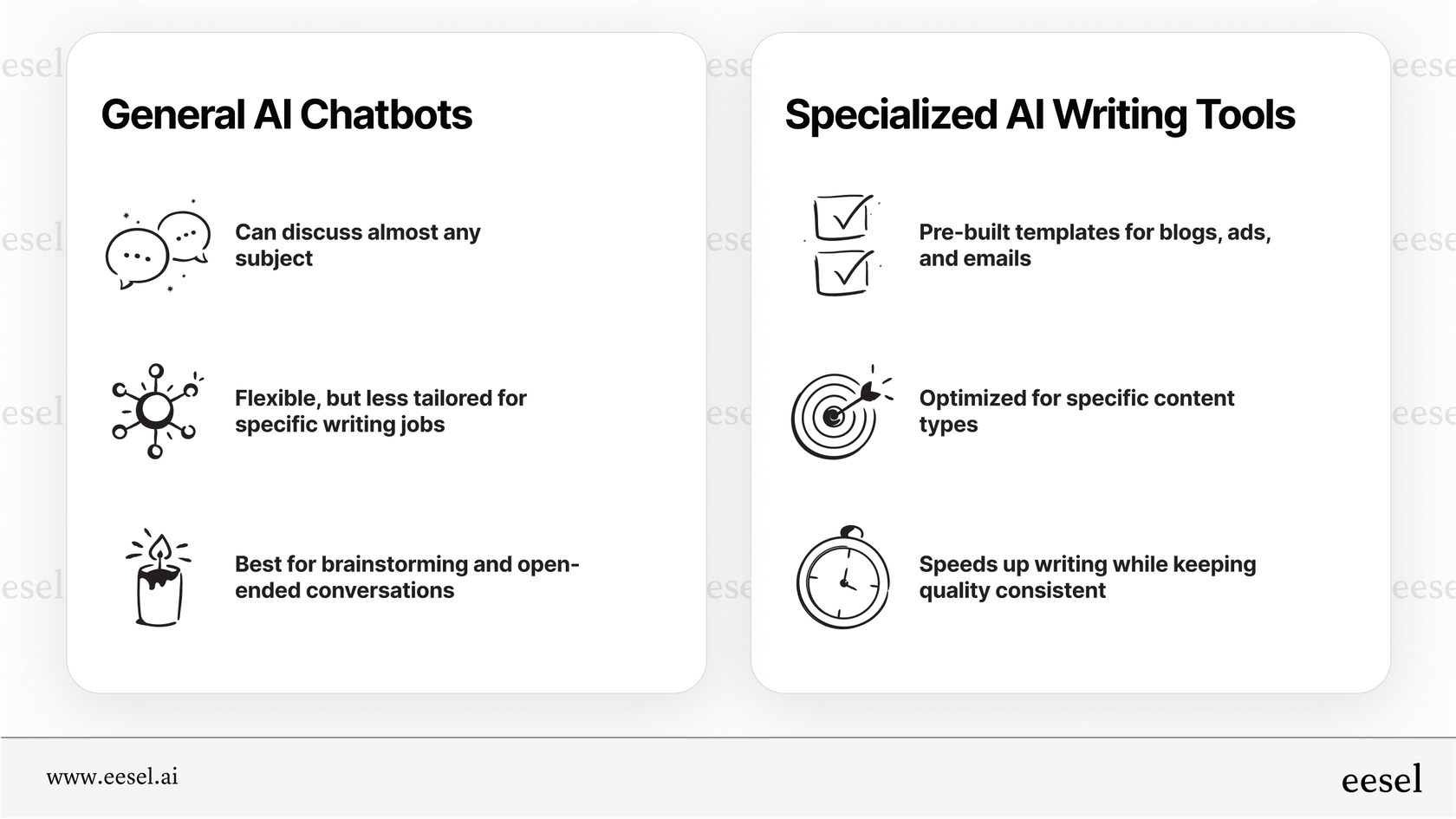
How we chose the best AI tool in writing options for this list
To make this list actually useful, we didn't just grab the most popular names. We looked at each tool through a practical lens to see if it was worth recommending. Here’s what we focused on:
- How well does it actually write? We looked at the core writing quality and whether it delivered on its promises.
- What is it really for? We checked if it was built for a specific job, like marketing, creative writing, or business operations.
- Is it easy to pick up? We considered how quickly a new user could get the hang of it without needing a manual.
- Does it play nice with other software? We looked at its ability to connect with other tools and adapt to a brand's voice.
- Is it worth the price? We weighed the cost against the features and the real-world value it provides.
The best AI tool in writing options at a glance
Here’s a quick rundown of the top AI writing tools we’ll be digging into.
| Tool | Best For | Key Features | Starting Price (Billed Annually) |
|---|---|---|---|
| eesel AI | Customer Support & Internal Comms | Drafts replies from past tickets, internal docs (Confluence, Google Docs), AI Actions | $239/month |
| Jasper | Marketing Teams | Brand voice, campaign workflows, SEO integration | $49/month |
| Copy.ai | Sales & Copywriting | Automated workflows, creative copy variations, email templates | $36/month |
| Writesonic | SEO Content Creation | Competitor analysis, SEO optimization, factual article writer | $16/month |
| Sudowrite | Creative & Fiction Writing | Story engine, character generation, scene expansion | $19/month |
| Writer | Enterprise & Regulated Industries | AI compliance, custom style guides, proprietary LLM | $18/user/month |
| Lex | Professional Writers & Editors | AI-assisted editing, simple interface, proofreading checks | $144/year (~$12/month) |
| Rytr | Beginners & Hobbyists | Simple UI, multiple use-case templates, affordable plans | $9/month |
| ChatGPT | General Purpose & Brainstorming | Free access, versatility, custom GPTs | Free (Plus from $20/month) |
The 9 best options for an AI tool in writing for every need in 2025
Now, let's get into what makes each of these tools a solid choice.
1. eesel AI
Most AI writing tools are all about marketing content. eesel AI goes a different route, focusing on a really important area: business communications. It’s an AI platform made for customer support and internal teams, acting as a smart layer over the tools you already use every day.
The secret sauce for eesel AI is where it gets its information. Instead of training on the generic web, its AI Copilot and AI Email Writer learn from your company’s own private knowledge. It connects to your help desk (like Zendesk or Freshdesk), your past support chats, and your internal wikis in Confluence or Google Docs. This means it can generate draft replies that are incredibly relevant, factually accurate, and already in your brand's voice. A general-purpose tool just can't compete with that. The best part is that it works right inside your current software, so you don't have to switch to a new system.
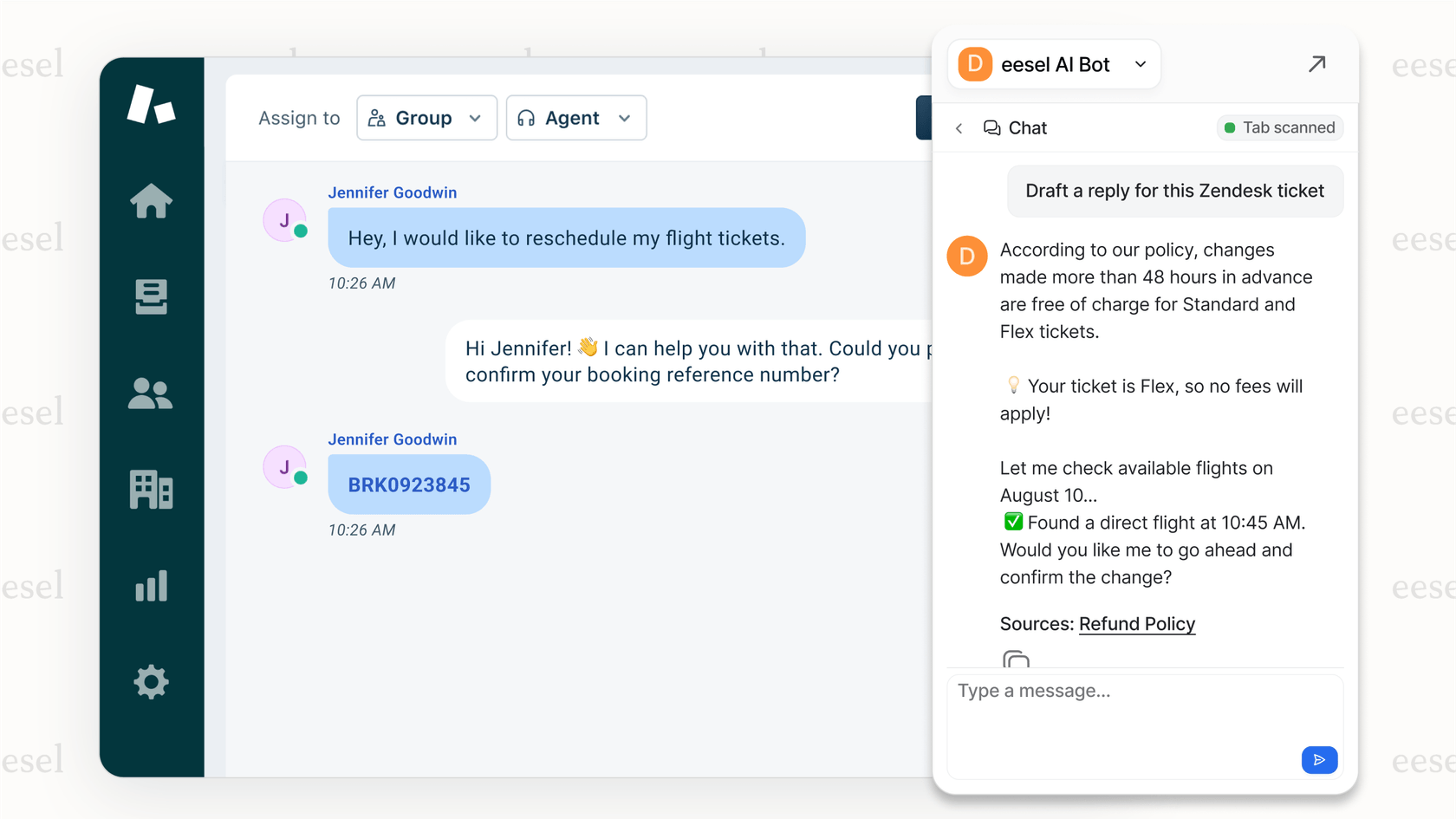
Pros:
- Suggests drafts based on your own business data, making them super relevant.
- Works directly inside the help desk and chat tools you already have.
- Helps new agents get up to speed faster and makes the whole team more efficient.
- Keeps your brand voice consistent and accurate in every customer interaction.
Cons:
- It's focused on support and internal teams, so it's not for general content marketing.
- The price is higher than beginner tools, as it’s built for business use.
Pricing: Starts at $239/month (billed annually) for the Team plan, which covers up to 1,000 AI interactions.
2. Jasper
Jasper has been around for a while in the AI writing world, and it has a polished, feature-rich platform that’s a great fit for marketing teams. Its key features let you save a specific brand voice, manage entire content campaigns from one spot, and connect with SEO tools like Surfer. If you're leading a marketing team that needs to produce a lot of on-brand content, Jasper is a solid choice.
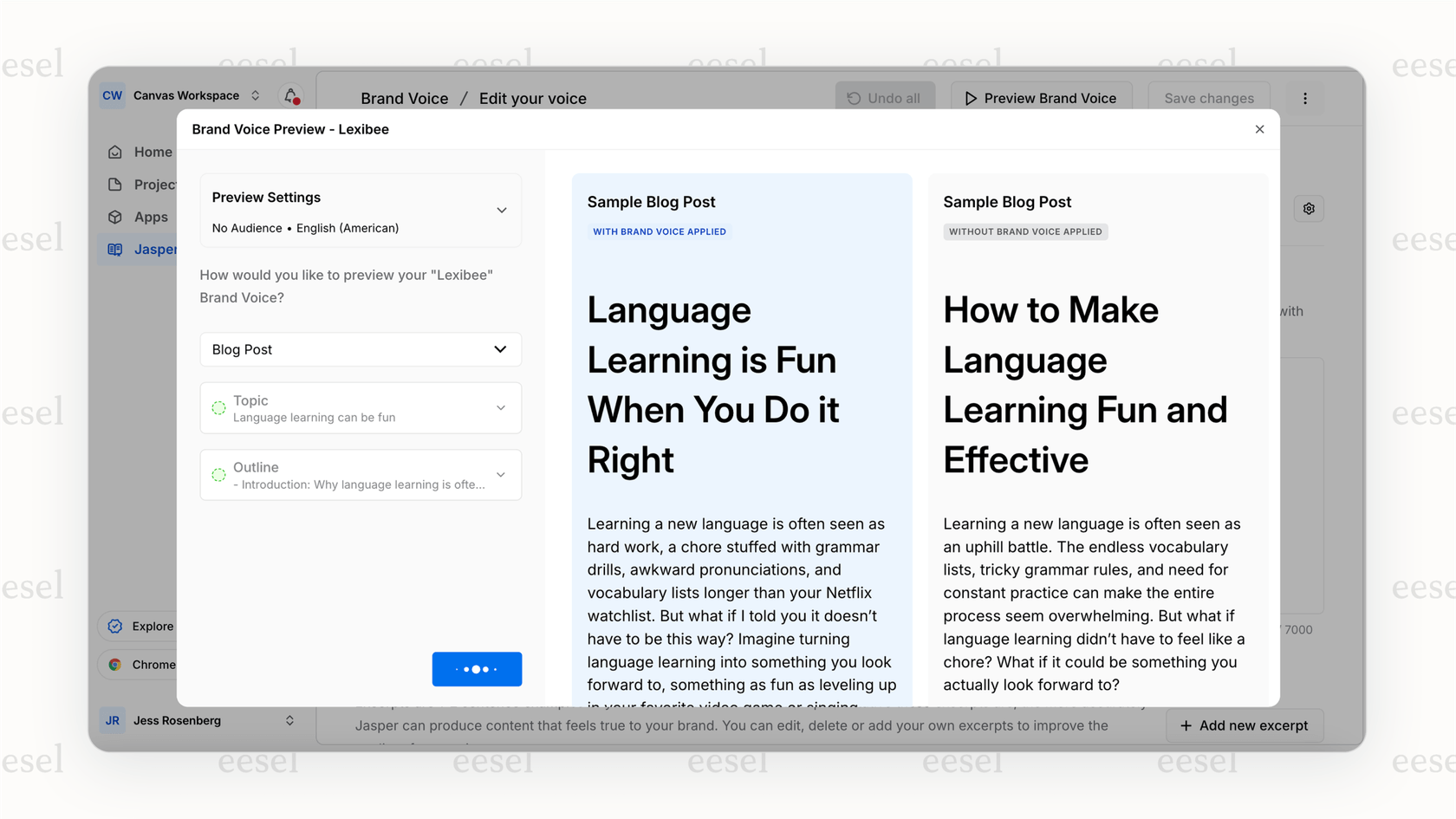
Pros: A lot of features for marketing, good for team collaboration, integrates with Grammarly. Cons: Can be pricey for individuals, might feel a bit complicated for simple writing tasks. Pricing: Starts at $49/month for the Creator plan.
3. Copy.ai
Copy.ai is another big name in this space, and it really comes alive when you're creating repeatable workflows for sales and marketing. If you write similar types of emails or social media posts regularly, Copy.ai can help automate a lot of that work. It's particularly good at generating different creative versions of ad copy, which is great for A/B testing to see what messaging clicks with your audience.
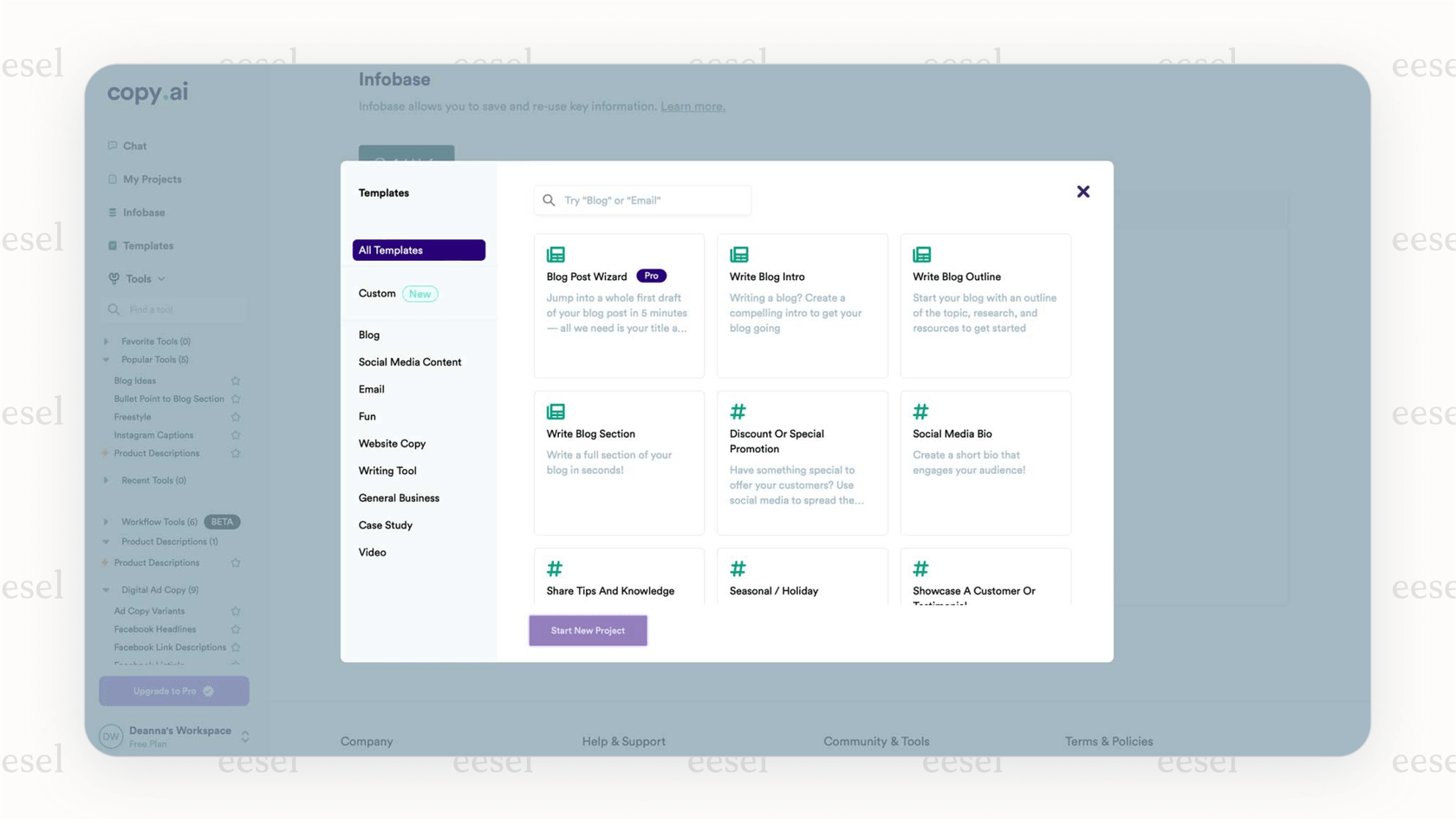
Pros: Great for automating repetitive writing, good templates, clean interface. Cons: Not as strong for writing long-form articles compared to other tools. Pricing: Has a limited free plan; paid plans begin at $36/month (billed annually).
4. Writesonic
If your content strategy is all about ranking on search engines, you should check out Writesonic. This tool was built for content marketers who are focused on SEO. It pulls in keyword analysis, competitor research, and factual data to help you write articles that are set up to rank well. It also gives you some control over the quality of the AI's output, which is useful for balancing your budget with performance.
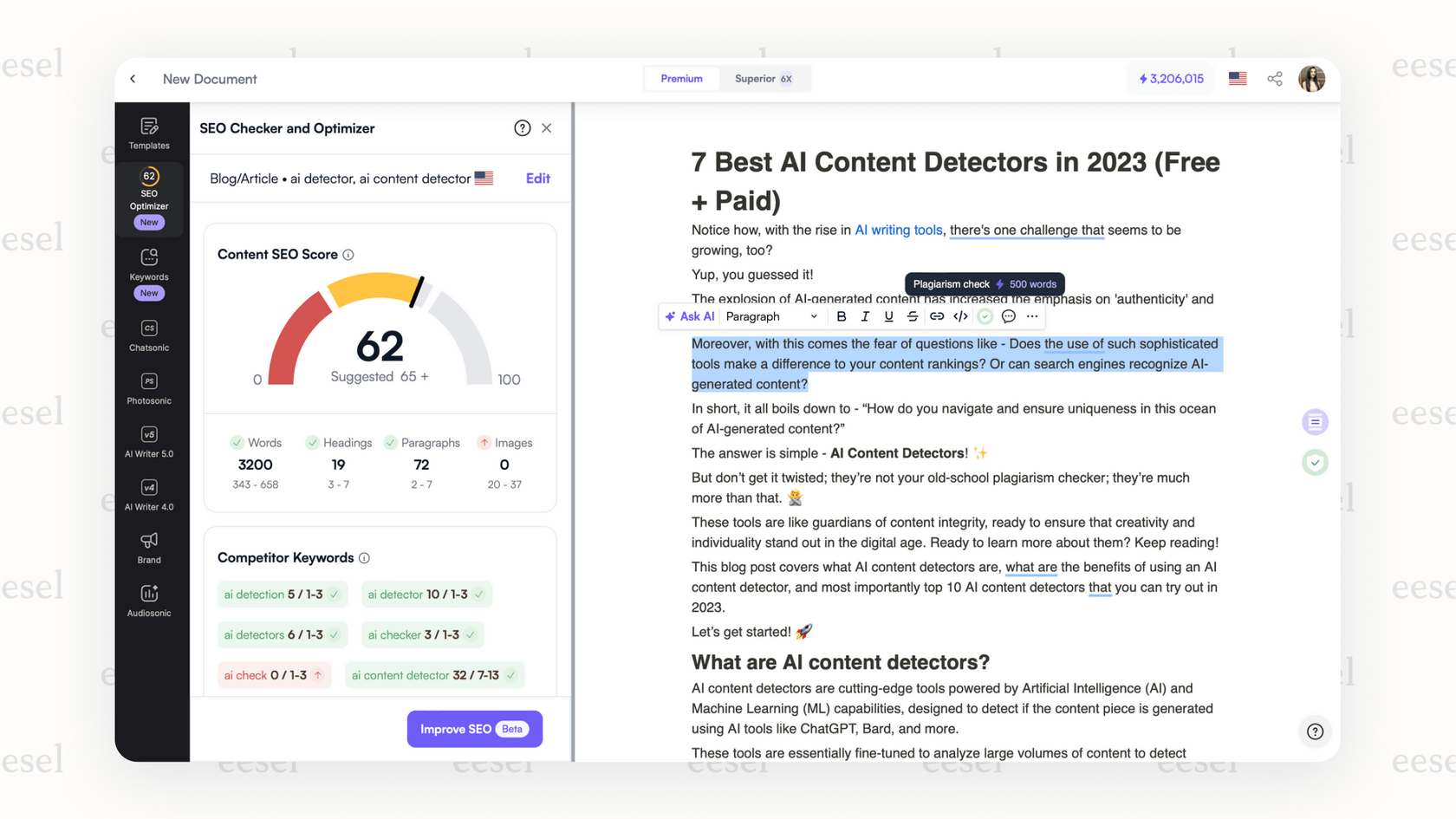
Pros: Has built-in SEO tools, lets you control AI output quality, includes factual writing modes. Cons: The credit-based pricing can be a little confusing, and the quality can change depending on which AI model you use. Pricing: Starts at $16/month for the Individual plan with a set number of premium credits.
5. Sudowrite
Sudowrite is something else entirely. It's not for marketers or business folks; it's for novelists, screenwriters, and anyone telling a story. This tool is meant to be a creative partner, helping you get past writer's block with features like "Brainstorm" and "Describe." Its story engine can help you come up with plot points, develop characters, or even turn a simple scene idea into a rich description. It’s a fun and one-of-a-kind tool for fiction writers.
The 'Describe' feature in Sudowrite, a unique AI tool in writing for fiction.
Pros: Tools are specifically for storytelling, fun and easy to use, helps with world-building. Cons: Its specific focus means it's not the right fit for business or marketing content. Pricing: Starts at $19/month for the Hobby & Student plan.
6. Writer
For big companies, especially in fields like finance or healthcare, Writer is often the go-to. Its biggest draw is its focus on security and AI compliance. It lets companies build and enforce custom style guides across the board, so every piece of content stays consistent and compliant. It runs on its own LLM that can be trained securely on a company's private data, making it a safe option for businesses concerned about privacy.
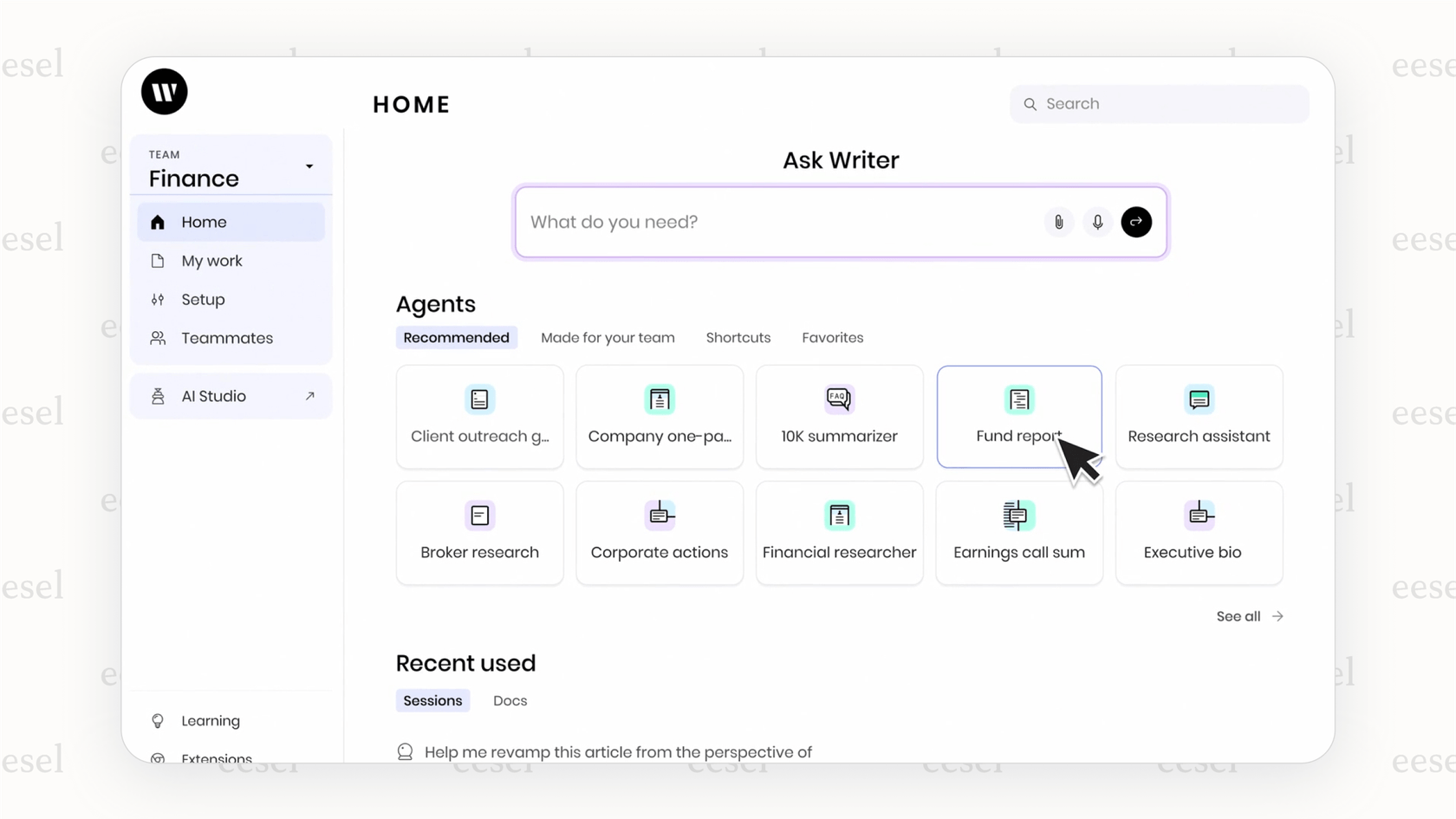
Pros: Big emphasis on security and compliance, great for keeping brand messaging consistent in large organizations. Cons: Takes some effort to set up, and the enterprise plans can get expensive. Pricing: Team plan starts at $18/user/month (for up to 5 users), with custom pricing for larger enterprise needs.
7. Lex
Lex goes for a "less is more" vibe. It’s a clean, simple word processor with AI features built right in. It’s made for professional writers and editors who want a smart assistant, not a content-generating machine. Instead of writing whole articles for you, Lex is great at helping you improve your own writing. It can suggest different ways to phrase things, flag clichés or passive voice, and help you polish your work. It feels more like a writing partner than a tool.
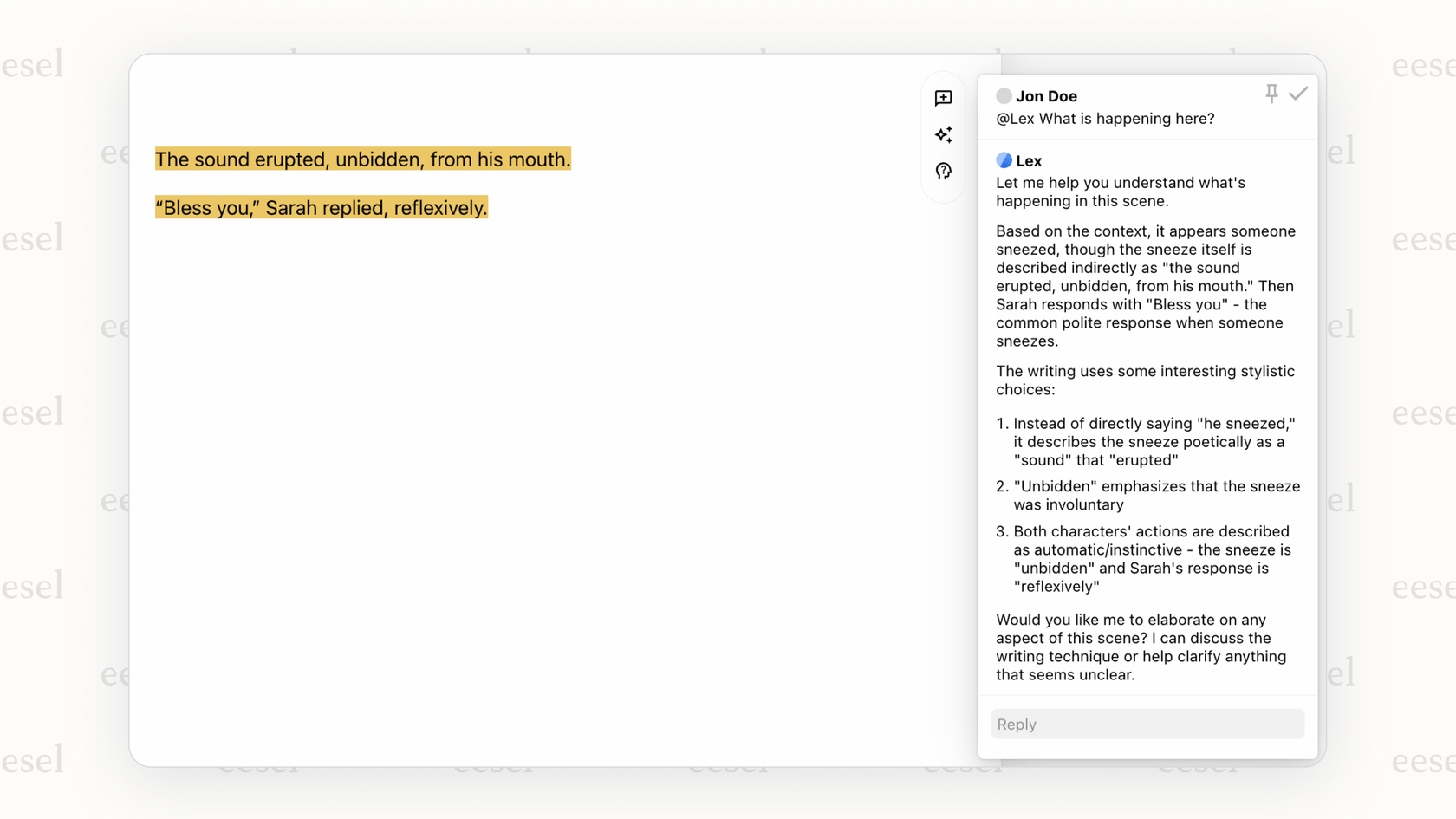
Pros: Simple and clean, excellent for editing and improving your own writing, feels collaborative. Cons: Has fewer content generation features than the marketing-focused tools. Pricing: Has a limited free version; the Pro plan is $144/year.
8. Rytr
If you’re just starting to explore AI writing, Rytr is a great place to begin. It's super easy to use and has one of the most affordable plans out there. With lots of templates for things like blog ideas and YouTube descriptions, it’s a good all-around tool for individuals, students, or small businesses on a budget. It might not have all the bells and whistles of the premium tools, but it offers a lot of bang for your buck.
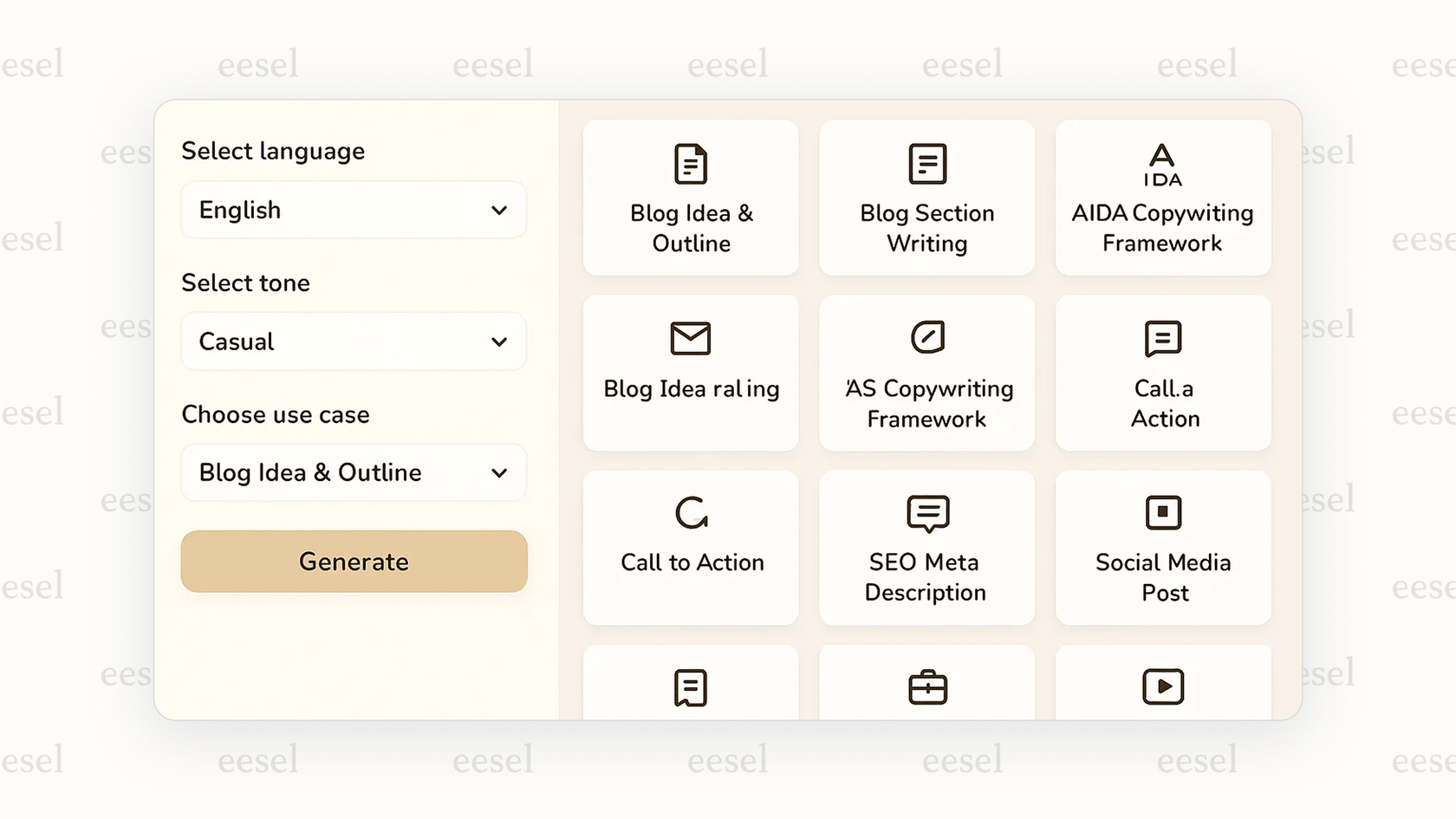
Pros: Very affordable, easy to get started with, has a generous free plan for trying it out. Cons: The writing can sometimes feel more generic than premium tools, and it doesn't have advanced customization. Pricing: Free plan available; the Unlimited plan starts at just $9/month.
9. ChatGPT
And of course, we have to talk about the one that got everyone's attention. ChatGPT is the Swiss Army knife of AI. It’s a very powerful and flexible chatbot that can help with brainstorming, outlining, and answering pretty much any question you have. It doesn't have the specialized workflows and templates of dedicated writing tools, but its free version is surprisingly good, making it a go-to for quick ideas and general writing help.
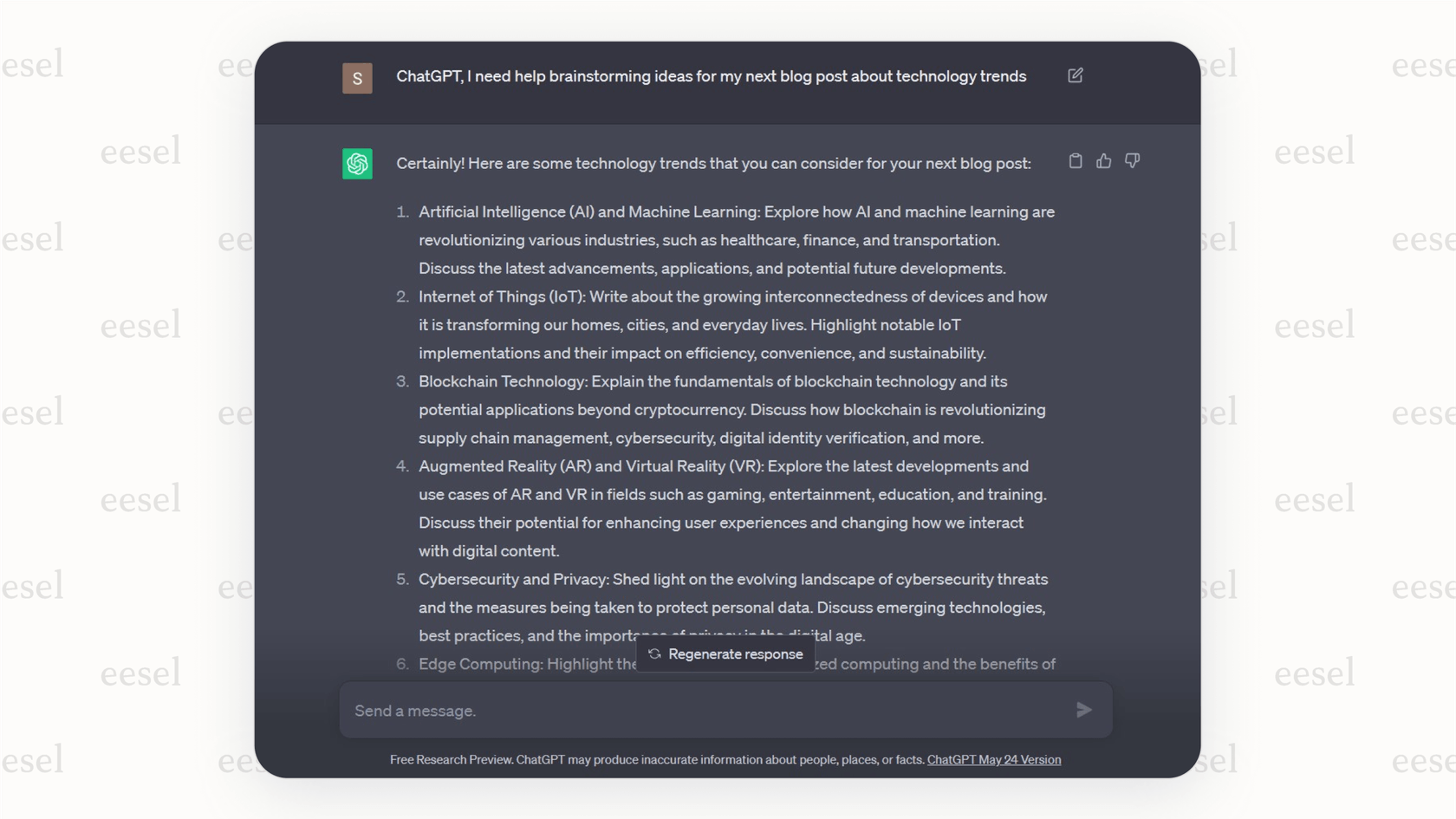
Pros: Extremely versatile, the free version is quite powerful, has a huge community and custom GPTs. Cons: It isn't a specialized writing tool, so you have to be very specific with your prompts to get good results. Pricing: Free plan available; ChatGPT Plus is $20/month.
Pro tips: how to get the most out of your AI tool in writing
Picking the right tool is only half the battle; how you use it makes all the difference. Here are a few tips to get better results:
- Be specific with your instructions. The more context you give the AI, the better the output will be. Don't just ask it to "write a blog post about dogs." Instead, try: "Write a friendly, 500-word blog post for new dog owners about the top three essential items they need to buy." Mention the tone, audience, and key points you want to cover.
- Use it as a partner, not a replacement. The best way to use AI is for getting a first draft down, brainstorming ideas, or pushing past writer's block. You should always add your own expertise on top. You'll need to edit, check the facts, and add your own voice to make the content feel authentic.
- Train it on your own voice and knowledge. For business use, getting the AI to sound like you is key. The real power comes when the AI learns from your team's existing work. This is where a platform like eesel AI really stands out for support teams. It learns from thousands of your past support tickets and internal docs to make sure every reply it suggests is accurate and captures your brand's tone.
- Tweak and refine your drafts. The first version the AI spits out is rarely the final one. Use the tool's features to rewrite, expand, or shorten the text. Play around with it until the content says exactly what you want it to.
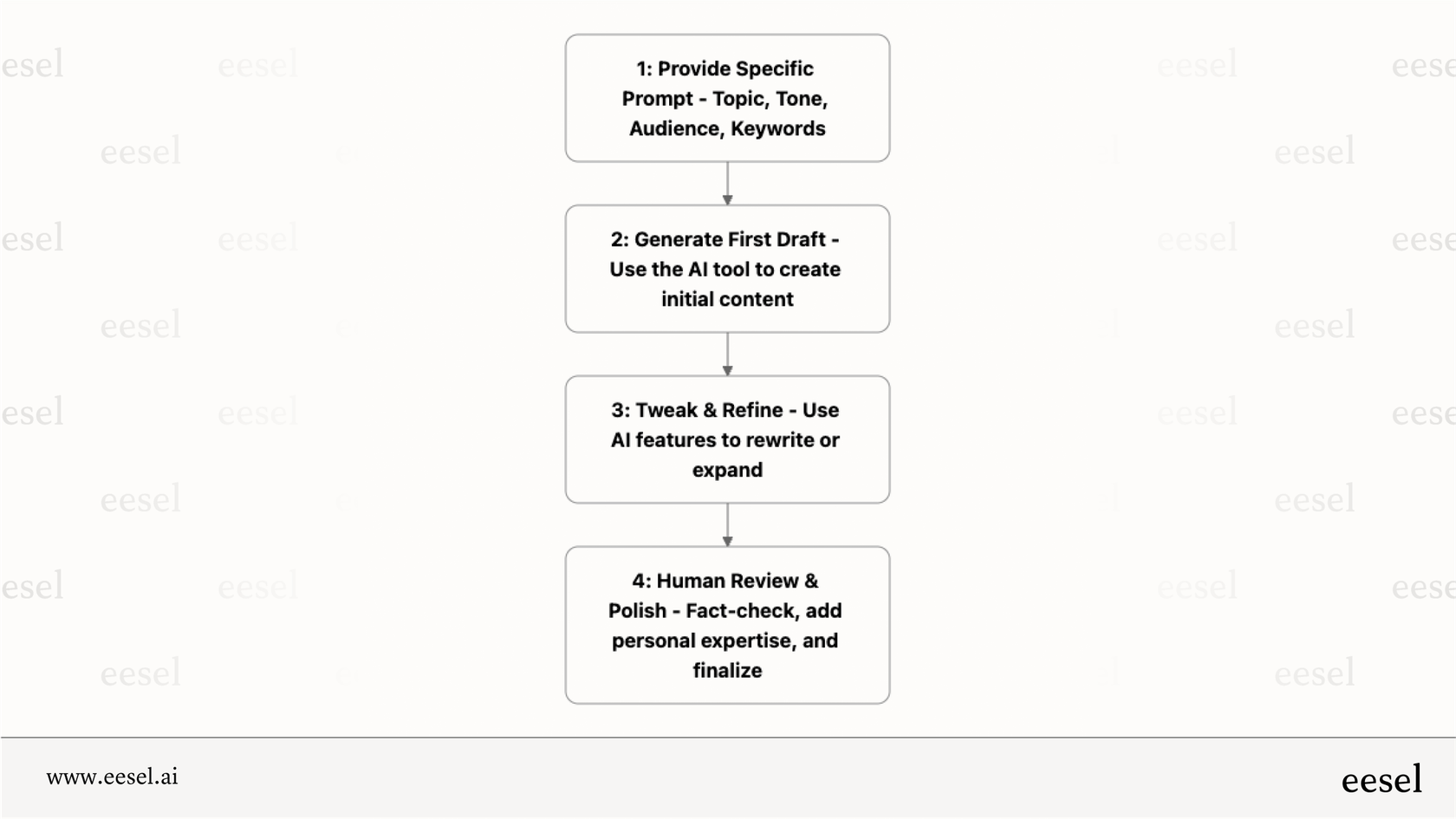
Finding the right AI tool in writing for the job
At the end of the day, the "best" AI writing tool is simply the one that fits what you need to do. General-purpose tools are great for many marketing and creative tasks, but specialized business work often requires a specialized tool. For high-stakes writing like customer support or internal documentation where accuracy, context, and brand voice are everything a platform built for that specific job is your best bet.
Ready to give your support team's writing a boost? eesel AI works with your existing help desk and knowledge bases to give your agents instant, on-brand draft replies.
Book a demo today or start a free trial to see how it works.
Frequently asked questions
Reputable tools generate original content, but it’s a best practice to run the final text through a plagiarism checker. This helps ensure your content is unique, especially for important SEO or academic work.
Yes, advanced tools can do this well. While some offer generic tones, platforms like Jasper let you create detailed voice profiles, and tools like eesel AI learn your brand voice directly from your team's past writing for the most authentic results.
You should always edit the output. Think of the AI as a creative partner that produces a solid first draft, but your human expertise is essential for fact-checking, refining the tone, and adding the final polish that makes content great.
It depends on your goal. Free tools are great for brainstorming, but a paid, specialized tool offers workflows and features designed for specific tasks like marketing or sales. This focused design often saves time and produces higher-quality, targeted content with less effort.
Security varies, so always check the provider's privacy policy. Enterprise-focused tools like Writer and eesel AI prioritize security, ensuring your private data isn't used to train public models and often offer stricter data-handling protocols.
First, clearly define the specific problem you want to solve, whether it’s creating blog drafts faster or improving support ticket responses. Choosing a tool designed for that exact use case will deliver the best results and make adoption much smoother for your team.
Share this post

Article by
Stevia Putri
Stevia Putri is a marketing generalist at eesel AI, where she helps turn powerful AI tools into stories that resonate. She’s driven by curiosity, clarity, and the human side of technology.




